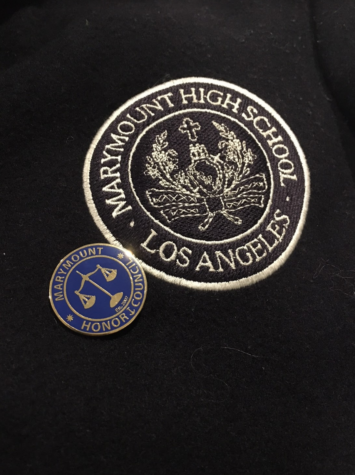Debunking Honor Council Myths
May 21, 2018
From serving as campus police to acting as a secret society, there are more than enough misconceptions about Marymount’s mysterious Honor Council. Most students do not interact with Honor Council beyond annual elections and the occasional Community video. Some people may have even forgotten who they elected. If this rings true to you, I would like to (re)introduce myself to you: Hello! I am Skyler, one of the junior representatives, and I am here to divulge the secrets of Honor Council.

It is not an uncommon occurrence for people to approach me with questions, yet it always surprises me how differently other people view Honor Council. Of course, I am a bit biased, but I truly believe Honor Council exists to give back to the community and educate on how to improve integrity on campus. It possesses the unique opportunity to provide the student perspective in these situations. In this sense, Honor Council is not as scary as people think. The people recommending consequences and bringing up issues have the same perspective as you! We are not a group of scary or intimidating students and faculty, waiting gleefully for someone to cheat on a test; but rather, we are a group of peers who enjoy working together to improve life for all members of the Marymount community.
While we do hold hearings over academic integrity issues, we do much more. In fact, we hate when a case comes up! A case reveals that we have failed to spread adequate awareness or thorough support. We treat each case as a learning opportunity for both the student and Honor Council. Even when there aren’t any cases to review, Honor Council meets every week to discuss relevant campus issues, new methods to increase integrity, and fun projects. Contrary to our feelings towards cases, videos are definitely our favorite thing to make; they are entertaining, hilarious, and great method to spread awareness.
Even though cases are not the only thing we do, they are definitely the most mysterious. Here is a quick rundown of the procedure:
- A possible academic integrity issue is brought to Ms. Regan by a faculty member.
- Ms. Regan interviews both the faculty member and students involved. She then decides if the issue should be brought to Honor Council as a case.
- If the incident becomes an Honor Council case, all information is presented to Honor Council. All information is kept 100 percent confidential!
- A hearing takes place in which Honor Council talks to the student to get a better understanding of the incident and all other factors involved.
- After talking to the student and discussing the entire case, Honor Council suggests a consequence. We also contemplate what we can do to help prevent similar incidents from occurring again. All final decisions are made by senior administrators.
- Every member of Honor Council, students and teachers, immediately “forgets” the case and acts no differently.
Honor Council’s goal is to seek the truth, act fairly, and be understanding. The main difference between having an Honor Council versus simply senior administrators, is the variety of perspectives. Students and teachers inarguably have different outlooks on school life and issues. Through Honor Council, both sides can express themselves and mix to produce fair recommendations. Did you know that Honor Council was established by a girl who broke the honor commitment and thought her consequence was unfairly chosen? Honor Council takes everything into consideration: the incident itself, personal factors, how students act during a hearing, and honesty above all. We strive to recommend consistent consequences while still addressing the individual complexities of each case.
I hope this clears up some of the mystery of Honor Council! An important thing to note is that while I use the pronoun “we” quite frequently, this is my experience from Honor Council. I guarantee that each member has gained something different from being a representative, but the sentiment remains the same. We are not the police waiting for someone to make a mistake. We simply want to help improve community and promote integrity. If you have any questions, you can always ask!



Amie Kosberg • May 22, 2018 at 12:30 pm
This is simply a BRILLIANT and informative article, written before Skyler became CO-PRESIDENT of Honor Council with Eugenia Baek! How do I tag Mr. Baker? : )
Samantha Hazell-O'Brien • May 24, 2018 at 8:02 am
Thank you, Sra. Kosberg. Please share this article with Mr. Baker and invite him to register with The Anchor to comment on the article!